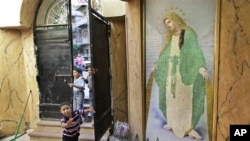Christians in the Middle East are on alert after Islamist extremists called them "legitimate targets" days after a bloody siege of a Baghdad church. In Egypt, security has been stepped up around Christian sites as Islamists demand the release of two Coptic women who reportedly converted to Islam.
Al-Qaida in Iraq posted a internet statement saying "the killing sword will not be lifted" from the necks of Christians, in Iraq and across the region.
The speaker said his group will go after "your children" in Syria, Lebanon and Egypt, adding there are hundreds of thousands of Christians and hundreds of churches on what he referred to as Islamic soil. He said they will be targeted if Christians do not submit to his group's demands.
Among the demands of the militants, which include al-Qaida in Iraq and its umbrella group, the Islamic State of Iraq, is the release of two Egyptian women some Muslims claim are being held against their will after converting to Islam.
The men who attacked the Our Lady of Salvation Church Sunday in Baghdad told Egyptian Coptic authorities they had 48 hours to let the women go.
Leaders of the Coptic church deny the women are being held anywhere, calling the assertion "an illusion in the minds of sick people."
Kamilyah Shehatah and Wafaa Constantine, both married to Coptic priests, have been at the center of a local controversy over whether they might have converted to Islam in order to gain a divorce from their husbands. Both women have disappeared from public view.
But many Egyptian Muslims were united in the face of the militants' threats. In a statement, the main Islamic political group, the Muslim Brotherhood, said Muslims should protect the holy places of all religions. It urged the state to provide Christian places of worship with more security following the threats.
The government made reference to the matter in its condemnation of the Baghdad church siege, which left 57 people dead, saying Egypt categorically rejects having its affairs "pushed into such criminal acts."
Security was heightened around Coptic areas in Cairo. The area, in an ancient part of the capital, is normally well protected, a sign of the sometimes uneasy relations between the nation's majority Muslims and Copts, who make up about 10 percent of population.
Egypt's eight million Christians make it by far the biggest such community in the Middle East. But its numbers, like those elsewhere in the region, have declined in recent decades.
Roman Catholic Pope Benedict spoke out again this week on the need to protect Christians across the region.
Copts say they face discrimination, and tensions have on occasion erupted into violent assaults, including an attack on worshipers celebrating this year's Coptic New Year in the central Egyptian town Nag Hammadi. Muslim gunmen killed at least seven Christians and a Muslim policeman who tried to defend them.
Government officials say they have stepped up security for a Coptic festival that about two million Christians are expected to attend in Luxor, south of Nag Hammadi.
Al-Qaida Threatens Christians in Egypt, Elsewhere in Middle East













